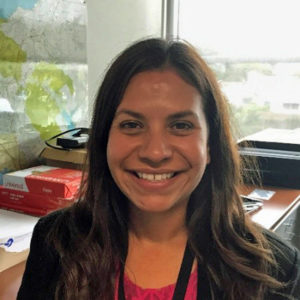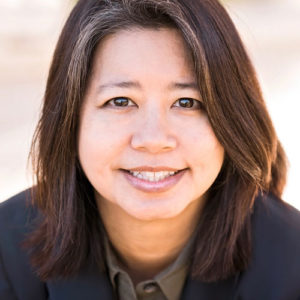By Catarina Kidd, AICP, July 2020
Lina Velasco, AICP, is Community Development Director (CDD) for the City of Richmond. She holds a master of community and regional planning from Cornell University and a BA from UCLA in history and Chicana/o studies.
What experiences shaped your decision to become a city planner?
I started as a life science major at UCLA intending to become a doctor. I am a first-generation college student in my family. I took part in several university summer programs where I took electives in ethnic studies and met great people who challenged me. It was fascinating to learn the history of LA and how planning decisions impacted communities of color. That spoke to me. I wanted to make sure communities of color were engaged in planning processes that influence decision-making.
After completing my education, I wanted to return to the Bay Area (where I grew up) and started at Vacaville as an assistant planner. Prior to that, I had interned with the Housing Authority of the City of Los Angeles. I have been with the City of Richmond since 2005, and CDD since January.
Working with the public can be difficult. How do you stay inspired?
Sometimes there is a perspective that things don’t need to change. People are happy with how their neighborhoods are today, but there are bigger global issues — such as climate change and health inequities — that need to be addressed. In Richmond, we are working toward these larger goals through sustainable neighborhoods.
As planners, we might try things that don’t work out the way we anticipated. We have to be flexible in responding to ideas generated by our communities in addressing these bigger issues.
Having residents involved with the process keeps me inspired. Richmond has neighborhood councils that meet regularly to work on issues that need to be addressed. The amount of time they dedicate to improving their community is really inspiring. That motivates us to create the change we all envisioned in the General Plan.
How have you approached major issues in your community?
We were dealing with a high homicide rate in Richmond when I started, confronted with how we could all contribute to reducing that. This was not just a police issue to address. It involved planning, community groups, nonprofits, and many other stakeholders coming together, all while governments were shrinking. Everyone needed to collaborate, get creative, and adopt a broad perspective. We engaged the community through schools and other venues, not just at City Hall.
Another major issue is the census — we currently have a promotion underway because we want to have everyone counted. So much of our work is informed by the census. It’s important for us to know who lives in our community to inform our planning and city services.
How was your transition from senior planner to management?
We are a small organization, so it is not realistic to separate the technical planning work from management. I currently manage both projects and people. There are many challenges on the horizon, including how to manage gaps in the City budget. The Covid-19 pandemic forced us to increase our ability to work remotely and provide services online, and that is how we are managing all the essential tasks and services.
Are you particularly proud of a recent project or program?
A housing project had neighbors concerned about traffic safety. Of course, we were designing elements within the project to address that concern. In the end, neighbors shared that they felt they were fairly treated. When you work really hard to address concerns and provide public benefits — even when people don’t get exactly what they want — it is helpful to get that acknowledgement.
What advice do you have for planners interested in developing their leadership skills?
Sometimes you have to volunteer yourself. Raise your hand and say yes to different things. You learn so much about a process by doing it hands-on. Go to conferences to hear different perspectives. Consider serving as a speaker or on a panel or workgroup, and start locally. This is an opportunity to connect with people and see what work they are doing. Try new things and stay involved, whether locally or statewide.
We do that a lot here in Richmond. Other cities are dealing with similar projects and problems. Cities are happy to share their lessons learned. We have limited resources and can learn from each other.
Any specific thoughts about the planning profession?
Note the national discussion around re-envisioning policing. The planning profession is also reimagining its role. We must make sure planning is inclusive and equitable, and that we consider health outcomes in our decision making. We need to continue these conversations if we are to see our role and work evolve. How are we engaging residents and communities? Make sure we keep that in the forefront of our efforts.



 Interviewer Catarina Kidd, AICP, is senior development manager at FivePoint and a guest writer for Northern News. Final editing by associate editor Richard Davis.
Interviewer Catarina Kidd, AICP, is senior development manager at FivePoint and a guest writer for Northern News. Final editing by associate editor Richard Davis.